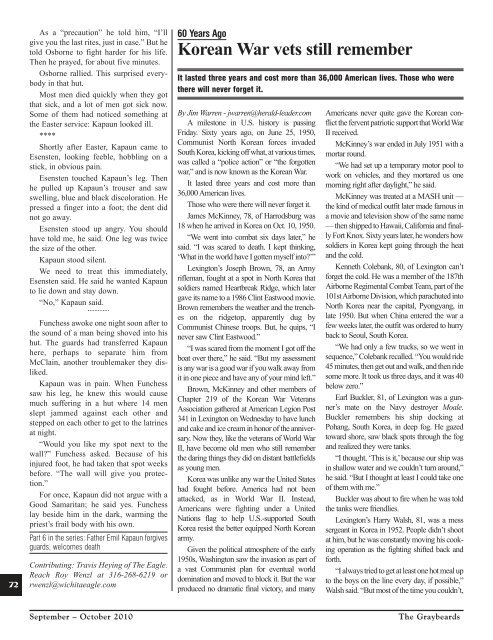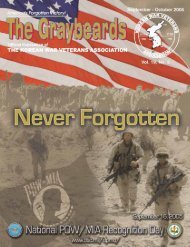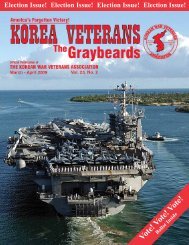Graybeards - Korean War Veterans Association
Graybeards - Korean War Veterans Association
Graybeards - Korean War Veterans Association
You also want an ePaper? Increase the reach of your titles
YUMPU automatically turns print PDFs into web optimized ePapers that Google loves.
72<br />
As a “precaution” he told him, “I’ll<br />
give you the last rites, just in case.” But he<br />
told Osborne to fight harder for his life.<br />
Then he prayed, for about five minutes.<br />
Osborne rallied. This surprised everybody<br />
in that hut.<br />
Most men died quickly when they got<br />
that sick, and a lot of men got sick now.<br />
Some of them had noticed something at<br />
the Easter service: Kapaun looked ill.<br />
****<br />
Shortly after Easter, Kapaun came to<br />
Esensten, looking feeble, hobbling on a<br />
stick, in obvious pain.<br />
Esensten touched Kapaun’s leg. Then<br />
he pulled up Kapaun’s trouser and saw<br />
swelling, blue and black discoloration. He<br />
pressed a finger into a foot; the dent did<br />
not go away.<br />
Esensten stood up angry. You should<br />
have told me, he said. One leg was twice<br />
the size of the other.<br />
Kapaun stood silent.<br />
We need to treat this immediately,<br />
Esensten said. He said he wanted Kapaun<br />
to lie down and stay down.<br />
“No,” Kapaun said.<br />
Funchess awoke one night soon after to<br />
the sound of a man being shoved into his<br />
hut. The guards had transferred Kapaun<br />
here, perhaps to separate him from<br />
McClain, another troublemaker they disliked.<br />
Kapaun was in pain. When Funchess<br />
saw his leg, he knew this would cause<br />
much suffering in a hut where 14 men<br />
slept jammed against each other and<br />
stepped on each other to get to the latrines<br />
at night.<br />
“Would you like my spot next to the<br />
wall?” Funchess asked. Because of his<br />
injured foot, he had taken that spot weeks<br />
before. “The wall will give you protection.”<br />
For once, Kapaun did not argue with a<br />
Good Samaritan; he said yes. Funchess<br />
lay beside him in the dark, warming the<br />
priest’s frail body with his own.<br />
Part 6 in the series: Father Emil Kapaun forgives<br />
guards, welcomes death<br />
Contributing: Travis Heying of The Eagle.<br />
Reach Roy Wenzl at 316-268-6219 or<br />
rwenzl@wichitaeagle.com<br />
60 Years Ago<br />
<strong>Korean</strong> <strong>War</strong> vets still remember<br />
It lasted three years and cost more than 36,000 American lives. Those who were<br />
there will never forget it.<br />
By Jim <strong>War</strong>ren - jwarren@herald-leader.com<br />
A milestone in U.S. history is passing<br />
Friday. Sixty years ago, on June 25, 1950,<br />
Communist North <strong>Korean</strong> forces invaded<br />
South Korea, kicking off what, at various times,<br />
was called a “police action” or “the forgotten<br />
war,” and is now known as the <strong>Korean</strong> <strong>War</strong>.<br />
It lasted three years and cost more than<br />
36,000 American lives.<br />
Those who were there will never forget it.<br />
James McKinney, 78, of Harrodsburg was<br />
18 when he arrived in Korea on Oct. 10, 1950.<br />
“We went into combat six days later,” he<br />
said. “I was scared to death. I kept thinking,<br />
‘What in the world have I gotten myself into?’”<br />
Lexington’s Joseph Brown, 78, an Army<br />
rifleman, fought at a spot in North Korea that<br />
soldiers named Heartbreak Ridge, which later<br />
gave its name to a 1986 Clint Eastwood movie.<br />
Brown remembers the weather and the trenches<br />
on the ridgetop, apparently dug by<br />
Communist Chinese troops. But, he quips, “I<br />
never saw Clint Eastwood.”<br />
“I was scared from the moment I got off the<br />
boat over there,” he said. “But my assessment<br />
is any war is a good war if you walk away from<br />
it in one piece and have any of your mind left.”<br />
Brown, McKinney and other members of<br />
Chapter 219 of the <strong>Korean</strong> <strong>War</strong> <strong>Veterans</strong><br />
<strong>Association</strong> gathered at American Legion Post<br />
341 in Lexington on Wednesday to have lunch<br />
and cake and ice cream in honor of the anniversary.<br />
Now they, like the veterans of World <strong>War</strong><br />
II, have become old men who still remember<br />
the daring things they did on distant battlefields<br />
as young men.<br />
Korea was unlike any war the United States<br />
had fought before. America had not been<br />
attacked, as in World <strong>War</strong> II. Instead,<br />
Americans were fighting under a United<br />
Nations flag to help U.S.-supported South<br />
Korea resist the better equipped North <strong>Korean</strong><br />
army.<br />
Given the political atmosphere of the early<br />
1950s, Washington saw the invasion as part of<br />
a vast Communist plan for eventual world<br />
domination and moved to block it. But the war<br />
produced no dramatic final victory, and many<br />
Americans never quite gave the <strong>Korean</strong> conflict<br />
the fervent patriotic support that World <strong>War</strong><br />
II received.<br />
McKinney’s war ended in July 1951 with a<br />
mortar round.<br />
“We had set up a temporary motor pool to<br />
work on vehicles, and they mortared us one<br />
morning right after daylight,” he said.<br />
McKinney was treated at a MASH unit —<br />
the kind of medical outfit later made famous in<br />
a movie and television show of the same name<br />
— then shipped to Hawaii, California and finally<br />
Fort Knox. Sixty years later, he wonders how<br />
soldiers in Korea kept going through the heat<br />
and the cold.<br />
Kenneth Colebank, 80, of Lexington can’t<br />
forget the cold. He was a member of the 187th<br />
Airborne Regimental Combat Team, part of the<br />
101st Airborne Division, which parachuted into<br />
North Korea near the capital, Pyongyang, in<br />
late 1950. But when China entered the war a<br />
few weeks later, the outfit was ordered to hurry<br />
back to Seoul, South Korea.<br />
“We had only a few trucks, so we went in<br />
sequence,” Colebank recalled. “You would ride<br />
45 minutes, then get out and walk, and then ride<br />
some more. It took us three days, and it was 40<br />
below zero.”<br />
Earl Buckler, 81, of Lexington was a gunner’s<br />
mate on the Navy destroyer Moale.<br />
Buckler remembers his ship docking at<br />
Pohang, South Korea, in deep fog. He gazed<br />
toward shore, saw black spots through the fog<br />
and realized they were tanks.<br />
“I thought, ‘This is it,’ because our ship was<br />
in shallow water and we couldn’t turn around,”<br />
he said. “But I thought at least I could take one<br />
of them with me.”<br />
Buckler was about to fire when he was told<br />
the tanks were friendlies.<br />
Lexington’s Harry Walsh, 81, was a mess<br />
sergeant in Korea in 1952. People didn’t shoot<br />
at him, but he was constantly moving his cooking<br />
operation as the fighting shifted back and<br />
forth.<br />
“I always tried to get at least one hot meal up<br />
to the boys on the line every day, if possible,”<br />
Walsh said. “But most of the time you couldn’t,<br />
September – October 2010<br />
The <strong>Graybeards</strong>

















